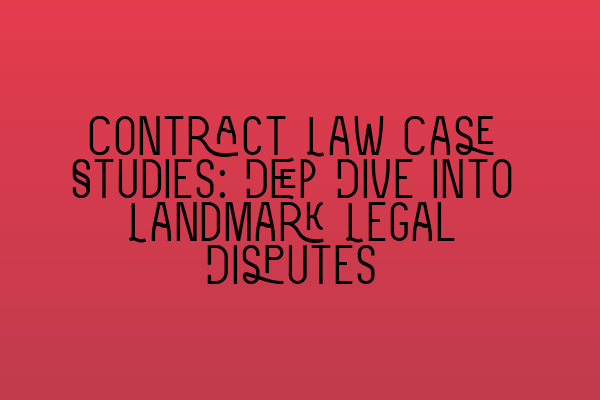Contract Law Case Studies: Deep Dive into Landmark Legal Disputes
As a solicitor specializing in contract law, I have had the privilege of working on numerous complex legal disputes. In this blog post, I want to take you on a deep dive into some of the most fascinating landmark contract law cases. These cases have not only shaped the legal landscape but have also highlighted important principles that every legal professional should be aware of. So, let’s dive in!
1. Carlill v. Carbolic Smoke Ball Company (1893)
This case is often cited as a classic example of a unilateral offer and acceptance. The Carbolic Smoke Ball Company advertised a product that supposedly prevented influenza. They offered a reward of £100 to anyone who contracted influenza after using their product as directed. Mrs. Carlill used the product but still contracted influenza. The court held that the advertisement constituted a binding contract between the company and the consumer, emphasizing that the intention to be bound by the promise can be inferred from the language used.
2. Balfour v. Balfour (1919)
This case explores the concept of domestic agreements and the absence of an intention to create legal relations. Mr. Balfour promised to pay his wife a monthly allowance while they were living apart due to work reasons. However, their relationship broke down, and Mr. Balfour stopped making the payments. The court held that there was no intention to create legal relations in their domestic arrangement, and thus, Mrs. Balfour could not enforce the agreement.
3. Donoghue v. Stevenson (1932)
This famous case introduced the concept of negligence and established the duty of care owed by manufacturers to consumers. Mrs. Donoghue consumed a bottle of ginger beer which contained the remains of a decomposed snail. She fell ill and suffered from shock and gastroenteritis. Although there was no contractual relationship between Mrs. Donoghue and the manufacturer, the House of Lords ruled that the manufacturer owed a duty of care to consumers, leading to the modern law of negligence.
4. Hadley v. Baxendale (1854)
In this case, the court discussed the principles of remoteness of damage in contract law. The plaintiff, Hadley, operated a mill and needed a broken crankshaft replaced. He engaged Baxendale, a carrier, to deliver the damaged crankshaft to the manufacturer for a new one. Due to Baxendale’s delay, Hadley suffered substantial financial losses. The court held that Baxendale was not liable for damages that were not reasonably foreseeable at the time of entering into the contract.
5. Williams v. Roffey Bros & Nicholls (Contractors) Ltd (1990)
This case explores the concept of consideration and the development of the practical benefit principle, which expanded the traditional rules surrounding consideration. Roffey Bros subcontracted carpentry work to Williams, who later faced financial difficulties and threatened to abandon the project. Roffey Bros promised to pay Williams an additional amount to complete the work. The court held that Roffey Bros obtaining a practical benefit constituted valid consideration.
These case studies provide valuable insights into the complexities of contract law and highlight the importance of understanding its principles. As future solicitors preparing for the SQE exam, it is essential to familiarize ourselves with landmark cases and understand the legal theories they embody.
For further practice and preparation, I recommend checking out the following related articles:
– [SQE Sample Papers: Practice for Exam Success](https://free-mocks-sqe-training.co.uk/sqe-sample-papers-practice-for-exam-success/)
– [Adjusting Your SQE Strategy Based on Mock Performance](https://free-mocks-sqe-training.co.uk/adjusting-your-sqe-strategy-based-on-mock-performance/)
– [Peer Discussions Post-Mock: Learning from Collaboration and Feedback](https://free-mocks-sqe-training.co.uk/peer-discussions-post-mock-learning-from-collaboration-and-feedback/)
– [Adjusting Strategy Based on Mock Performance: Improving Your Approach](https://free-mocks-sqe-training.co.uk/adjusting-strategy-based-on-mock-performance-improving-your-approach/)
– [Strengthening Weak Areas in SQE: Targeted Practice for Improvement](https://free-mocks-sqe-training.co.uk/strengthening-weak-areas-in-sqe-targeted-practice-for-improvement/)
These resources will help you further enhance your understanding and succeed in your SQE exam preparation.
In conclusion, contract law is a fascinating area of law that is shaped by landmark cases. By studying these cases, we gain valuable insights into the intricacies of contract law principles and develop a deeper understanding of legal theories. Stay tuned for more engaging content on contract law and other legal topics.
